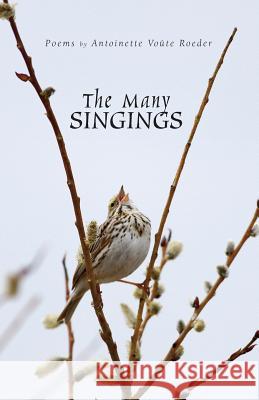The Many Singings » książka
The Many Singings
ISBN-13: 9781940671543 / Angielski / Miękka / 2014 / 146 str.
Poised on a meditation cushion in the very heart of nature, Antoinette Voute Roeder transports us to 'the cusp of the in between.' Geese fly, coyotes emerge from the woods, the heart lifts and falls and lifts again. These musical articulations in five movements constitute soulful breathings from the place where language arises, where silence is not void, but alive, awake. Her modulations of song filter a poet's life as through a heron's eye. -Susan McCaslin, author of Into the Mystic: My Years with Olga (Inanna, 2014) These thoughtful poems are compact but substantial. They reveal themselves in many layers. The fresh and delicate descriptions of herons, trees, clouds, and other natural wonders are both tender and ruthless. The poet is indignant about the devastation that greed and money have inflicted on nature but she is more than a "nature poet." Some pieces are penetrating self-disclosures and, though the words seem pared down, they leap off the page. Roeder is a skilled writer who has not succumbed to the dualism of "spiritual best, body is less." She praises embodiment as the "best of all gifts." The last section of the Singings is imbued with the sense of sacred presence while she places the paradox of mystery and naming at the centre. A reader may well sit by a window, gazing, as these poems are read. Singings is in praise of gazing. "Not even poetry," Roeder admits, "approximates gazing." -Hannah Main-van der Kamp, author of Slow Sunday on the Malaspina Strait"
Poised on a meditation cushion in the very heart of nature, Antoinette Voute Roeder transports us to the cusp of the in between. Geese fly, coyotes emerge from the woods, the heart lifts and falls and lifts again. These musical articulations in five movements constitute soulful breathings from the place where language arises, where silence is not void, but alive, awake. Her modulations of song filter a poets life as through a herons eye.-Susan McCaslin, author of Into the Mystic: My Years with Olga (Inanna, 2014)These thoughtful poems are compact but substantial. They reveal themselves in many layers. The fresh and delicate descriptions of herons, trees, clouds, and other natural wonders are both tender and ruthless. The poet is indignant about the devastation that greed and money have inflicted on nature but she is more than a "nature poet." Some pieces are penetrating self-disclosures and, though the words seem pared down, they leap off the page. Roeder is a skilled writer who has not succumbed to the dualism of "spiritual best, body is less." She praises embodiment as the "best of all gifts." The last section of the Singings is imbued with the sense of sacred presence while she places the paradox of mystery and naming at the centre. A reader may well sit by a window, gazing, as these poems are read. Singings is in praise of gazing. "Not even poetry," Roeder admits, "approximates gazing."-Hannah Main-van der Kamp, author of Slow Sunday on the Malaspina Strait











